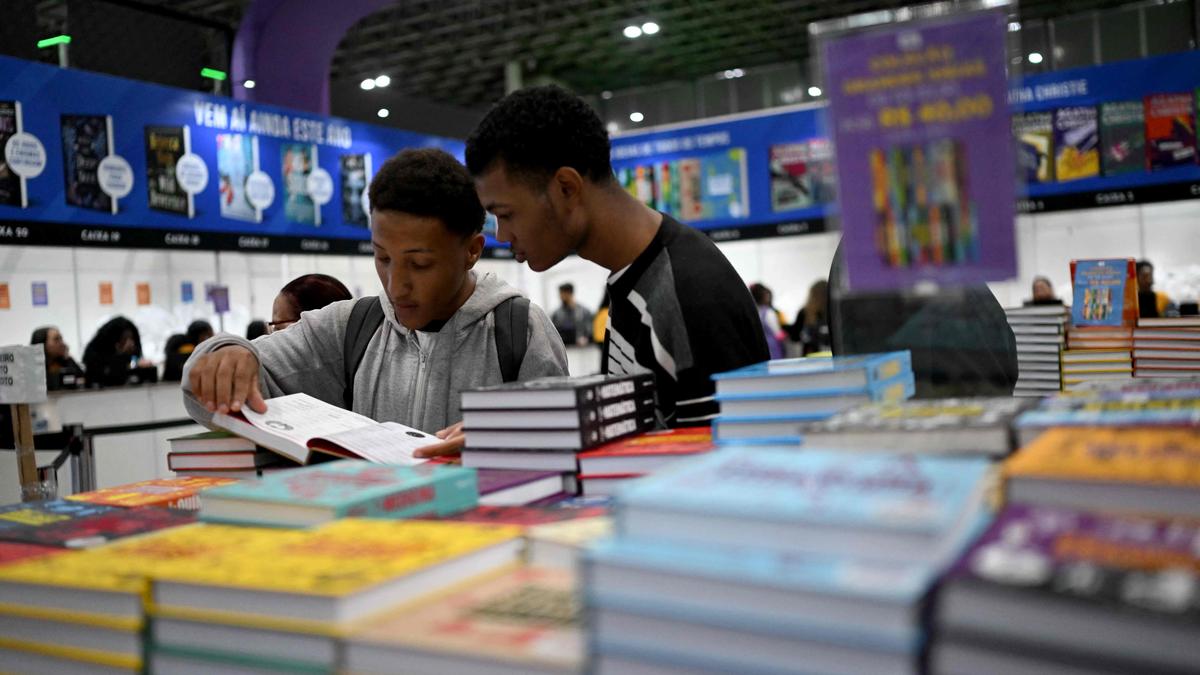
Visitors browse books at a stand of the Biennial International Book Fair at the Riocentro Convention Centre in Rio de Janeiro, Brazil, on June 18, 2025.
| Photo Credit: MAURO PIMENTEL
Nabokov used the word ‘mauve’ at least once in all of his books. From this, many assume that was his favourite word. Jane Austen used ‘civility’ often, while unsurprisingly, Agatha Christie had more ‘inquest’ than others. I think it’s quite a leap to conclude these were the favourites of the respective authors.
A better way of finding out would be to ask the authors the question: What is your favourite word? Ray Bradbury, author of Fahrenheit 451, when asked, said his favourite word was ‘cinnamon’. His explanation: “It derives from visiting my grandma’s pantry when I was a kid. I loved to read the labels on spice boxes; curries from far places in India and cinnamons from across the world.”
For novelist and twice Booker winner Hilary Mantel, the word was ‘nesh’. I had to look it up. It means ‘unusually susceptible to cold weather’, and suggests weakness or infirmity, or as Mantel described it, “fragile, a bit sorry for yourself.” Author Rebecca Mead’s is ‘grockles’, another word I had to look up. It is, I learnt, a mildly derogatory term for visiting tourists and holidaymakers. We know such people, and now we know what they are called.
Beautiful words tend to be a combination of something of personal significance, sound, memory, and possibilities. My own is ‘zephyr’, a soft gentle breeze, and when I hear it (which, admittedly is not very often), it evokes the visual of a casual wave of the hand over the shoulder which I once saw an actor do in a play. I don’t know why, but such things are not susceptible to logic. However, you can see how the combination of the ‘z’ and the ‘f’ sounds suggest something soothing and calm. Like the line in that Simon and Garfunkel song: “…freshly fallen, silent shroud of snow…”
My wife’s word is ‘quintessential’, while a dear friend puts it down as ‘velvet’. Surveys that have been done over the years give us a list of much-loved words: murmuring, tranquil, gossamer, melody, ailurophile (cat lover). There are many more, of course.
In a 2004 survey conducted by the British Council among non-English speaking people, it emerged that ‘mother’ was their favourite word. That is easy to understand for Indians for whom ‘ma, ‘amma’, ‘mataji’ and variants have become sacred, thanks as much to what they imply as to the power of our cinema. The hero attributing his strength and power to his mother has been a Bollywood trope for decades.
Another favourite seems to be ‘beautiful’. That too is easy to understand, if unimaginative. But what if we used a synonym instead? Like ‘pulchritudinous’. The guttural sound in the middle might ruin it for some, but it means ‘beautiful’ – surely an ugly word for a beautiful one.
Sometimes it is not the sound or the association that words conjure up that matter but dexterity. The novelist Jeanette Winterson’s word is ‘toast’ because “it does so much: a noun; a verb; a description of the Tory Party; the celebration we’ll be having on 5th July…”
Published – June 19, 2025 02:39 pm IST
